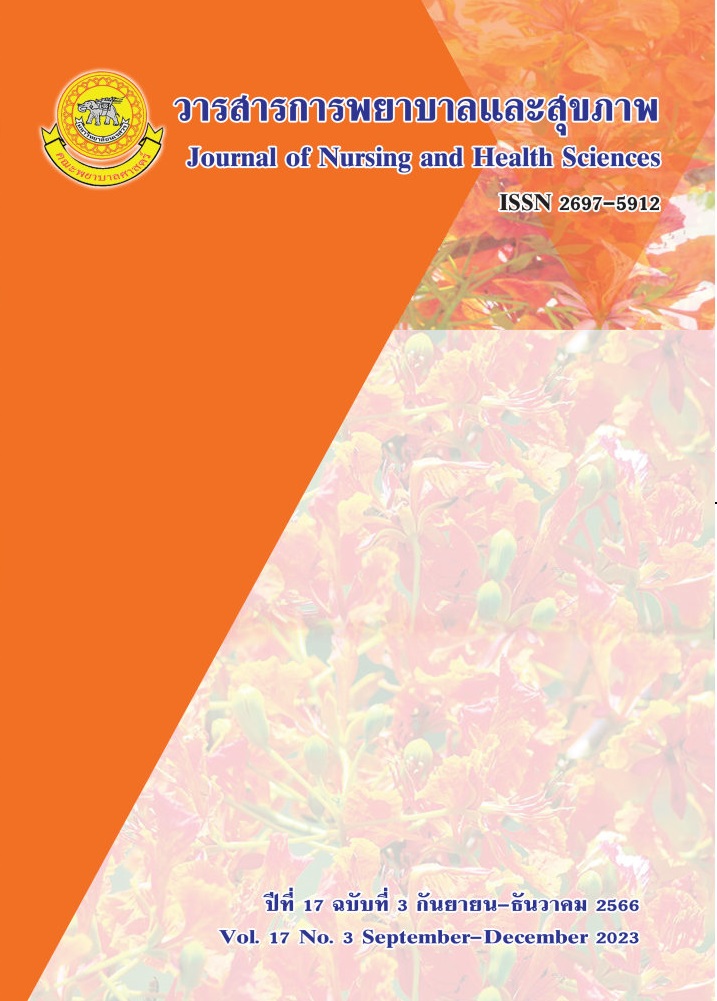Effects of the Self-Efficacy Enhancement Program with the Applied Fon-Jerng Danceon Falls Prevention Behaviors and Balance among Elderly in Phrae Province
Main Article Content
Abstract
This quasi-experimental study two groups pretest – posttest design was aimed to study the effects of a self-efficacy promotion program combined with applied dance on fall prevention behaviors balancing of the elderly in Phrae Province. The sample group studied were elderly people aged 60 years and over who were found to be at risk of falls. Using multi-stage sampling and purposive sampling and separated, 30 people were enrolled into the experimental group with a duration of 8 weeks. The tools were: 1) Fall Prevention Behavior Questionnaire in the Elderly; himself in conjunction with applied dance by applying the concept of self-efficacy theory (Bandura, 1997), with the index of conformity (IOC) equal to 0.87 - 0. 92 respectively. Paired t-test and independent t-test statistics were analyzed. Average score of balance of the elderly after the experimental group There was a statistically significant difference at the .001 level and the comparison of differences after the experiment. between the experimental group and the control group It was found that the mean score of fall prevention behavior and the mean score of balance of the elderly in the experimental group was significantly better than the control group (p< .001). and It was found that the mean score of fall prevention behavior and the mean score of balance of the elderly in the experimental group was better than the control group. There was a statistically significant difference at the .001 level. 001 and the comparison results after the experiment. between the experimental group and the control group It was found that the mean score of fall prevention behavior and the mean scores of balances in the elderly of the experimental group were better than the control group. There was a statistically significant difference at the .001 level.The results of this study can promote fall prevention behavior and the improve balance among elderly. To gain confidence in performing activities and practicing doing it yourself continuously.
Article Details

This work is licensed under a Creative Commons Attribution-NonCommercial-NoDerivatives 4.0 International License.
References
Anothaisinthavee, T., Thammakraisorn, S., & Srisuwan,P. (2022, August 22). Complete report systematic literature review Measures to prevent falls in the elderly. https://www.hitap.net/research/24183.
Areeruk, N., Rojpaisarnkit, K., & Wongprasit, N. (2015).The Effects of an Integrated Exercise Program on the Health Conditions, Physical Fitness,and Self-Efficacy Expectations of the Elderly.The Pubic Health Journal of Burapha university.10(2): 66-76. [In Thai].
Bandura, A. (1997). Self-Efficacy The Exercise of control. New York: W.H. Freeman and company.Bureau of Non-Communicable Diseases, Department of Disease Control, Ministry of Public Health.
(2016). Guidelines for prevention operations.Injuries by health facilities. Nonthaburi: Motion Arts. [In Thai].
Cohen J., (1988). Statistical power analysis for the behavioral sciences. 2nd ed. Hillsdale, NJ:Lawrence Erlbaum Associates, Publishers Dadgari, A., Hamid, A. T., Hakim, N. M., Mousavi, A.
S., Dadvar, L., Mohammadi, M., & Amerian, N.(2015). The role of self-efficacy on fear of falls and fall among elderly community dwellers in Shahroud, Iran. Nurs Pract Today, 2(3): 112-120.
Department of Older Persons. (2021). Statistics of the elderly. Accessed on November 22. https://www.dop.go.th/download/knowledge/th1663828576-1747_1.pdf
Flight, L., & Julious, S. A. (2016). Practical guide to sample size calculations: superiority trials.Pharmaceutical Statistics, 15(1), 75-79.https://doi.org/10.1002/pst.1718
Glass, G.V. (1976). Primary Secondary and Meta -analysis of Research. Education Research 10, 3-8. https://www.jameslindlibrary.org/glass-gv-1976/
Institute of Geriatric Medicine. (2019). Clinical practice guideline for the prevention and assessment of falls in the elderly. Nonthaburi, Department of Medical Service.
Jo, H.-E. & Kim, M. J. (2017, June 30). Effects of a Fall Prevention Program on Physical Fitness, Fall Efficacy and Fall Prevention Behavior among Community-dwelling Older Adults. The Korean Journal of Rehabilitation Nursing. The Korean Journal of Rehabilitation Nursing. http://doi.org/10.7587/kjrehn.2017.22
Na Nakhon, W. (2018). Effects of Applied FON-JERNG Exercise Dance Program on Physical Fitness of Elderly in The Sriwiang Village, Wiang Chai District, Chiang Rai Province. https://so03.tcithaijo.org/index.php/tahper/article/view/250426/170015
Nooake, S. (2018). Factors Influencing for Falls of In-Patients at a Regional Hospital in Bangkok Metropolis .https://he01.tci-thaijo.org/index.php/JNAE/article/view/245333/166541 [In Thai].
Pankong, O., and Sangournpak, O. (2012). Effect Rum Thai Prayouk on Muscular Strength, Activity of Daily Living and Well-being of Older Persons.Nursing Journal, 39: 118-127. [In Thai].
Phimsan, C., Sakulkim, S., Seubsui, N., Lodseeda, C., &Seesod, S. (2019). Effects of Shoulder Exercise Program on Exercise Behavior and Physical of Shoulder in Elderly, Bang Khun Si District,Bangkok Noi, Bangkok. Advanced Science Journal. 19(2): 27-43. [In Thai].
Phongpaew, S. (2013). Predicting Factors for Fall Prevention Behaviors in the Elderly, Nonthaburi Province.https://dric.nrct.go.th/Search/Search Detail/289029. [In Thai].
Phrae Provincial Public Health Office Ministry of Public Health. (2021). The number of elderly people with falls.Fall and hip and leg injuries in Phrae Province in 2019-2020. Accessed on 15 March 2021. [In Thai].
Prommapong, N. (2018). Factors related to fear of falling among older adult patient. Master's thesis, Faculty of Nursing-Science, Burapha University. [In Thai]
Soontorntai, P., Phakdepiboon, T., Sanjaroensuttikul,N., & Sinithanon, R. (2016). Efficacy of Beguine Dance on Balance in Elderly Thais with a History of Fall. J Thai Rehabil Med, 26(2):61-66. [In Thai].
Strategy and Planning Division. (2021, January 15).Situations of falls, year 2018. Retrieved 11 June 2021 from https://ddc.moph.go.th/uploads/files/1660320210115094236.pdf [In Thai].
Tantiwiboonchai, N. (2010). Effects of Muay Thai Aridic and Resistant band training with Vitamin D and Calcium supplement on Biochemical bone markers Health-Related Physical fitness and balance on the elderly women. Retrieved 13 November 2022 from http://ortho.md.chula.ac.th/LoadUnit/ index.php/2013-04-29-08-59-27/viewsubmission/388.html [In Thai].
Thagjirawattana, M., and Vudhirorarit, S. (2019).Predictive factors of fear of falling among elderly. Journal of Health Science Rescarch,13(2), 30-40. [In Thai].
Tosem, S. (2020). Effects of a Physical Activity Promoting Program on Self-Efficacy for Physical Activity, the Severity of Knee Osteoarthritis, and Balance among Persons with Knee Osteoarthritis. Rama Nurs J. 26(2). 172-187.
World Health Organization. (2007). WHO global report on falls prevention in olderage. Retrieved 2 February 2021 from https://extranet.who.int/agefriendlyworld/wp-content/uploads/2014/06/WHo-Global-report-on-falls-prevention-in-olderage.pdf


